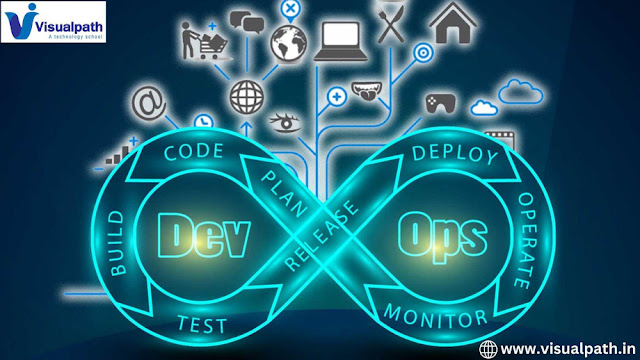- Get link
- X
- Other Apps
- Get link
- X
- Other Apps
DevOps. The term itself evokes images of streamlined efficiency, rapid software delivery, and a harmonious collaboration between developers and operations teams. But what exactly is DevOps? Is it just a fancy buzzword, or is there something more profound at play?
DevOps is, in essence, a cultural shift within the software development landscape. It's a philosophy that emphasizes breaking down silos between development and operations, fostering a spirit of collaboration, and leveraging automation to achieve faster, more reliable software delivery. It's not simply a set of tools, although tools do play a crucial role. It's a holistic approach that encompasses people, processes, and practices.
The Historical Divide:
Development vs. Operations
Traditionally, software development and operations existed in separate worlds. Developers focused on writing code, while operations handled deployment, infrastructure management, and troubleshooting. This siloed approach often led to friction and inefficiencies. Developers might blame operations for slow deployments, while operations might point fingers at buggy code causing production issues. DevOps Training
The DevOps Revolution: Breaking
Down the Walls
DevOps emerged as a response to this disconnect. It recognized that developers and operations teams have a shared goal: delivering high-quality software that meets the needs of the business. By fostering collaboration and a shared understanding of the entire software lifecycle, DevOps aims to:
- Shorten
the development life cycle: By automating repetitive tasks and integrating development
and operations processes, DevOps allows for faster software releases.
- Improve
software quality: Collaboration and shared responsibility lead to earlier
detection and resolution of bugs. DevOps Online Training
- Boost
reliability: Software deployments that are more stable and dependable are the
result of automation and ongoing monitoring.
- Enhance
innovation: Faster
release cycles and improved feedback loops allow for quicker
experimentation and innovation.
The Three Pillars of DevOps
DevOps rests on three
fundamental pillars:
1. Culture: This is the cornerstone of
DevOps. It's about fostering a culture of shared responsibility, open
communication, and continuous learning. Teams need to break down traditional
silos and work together towards a common goal. DevOps Online Training in Hyderabad
2. Practices: These include
methodologies like Agile development, continuous integration (CI), continuous
delivery (CD), and infrastructure as code (IaC). Agile promotes iterative
development and close collaboration, while CI/CD automates the process of
building, testing, and deploying code. IaC allows for infrastructure to be
treated as code, enabling provisioning and configuration management to be
automated.
3. Tools: A wide range of tools
support DevOps practices. These include version control systems like Git,
configuration management tools like Puppet or Chef, containerization
technologies like Docker, and monitoring tools like Prometheus.
Beyond the Tools: The Human
Factor
While tools are essential for
streamlining workflows, it's crucial to remember that DevOps is not just about
technology. It's about people. The following are some crucial facets of the
human component in DevOps: DevOps Training Online
- Communication: Effective communication between
developers, operations, and other stakeholders is paramount to success.
Regular meetings, knowledge sharing sessions, and open communication
channels foster trust and understanding.
- Shared
responsibility: In
a DevOps environment, everyone takes ownership of the entire software
lifecycle. Developers are responsible for writing clean, maintainable
code, while operations teams are actively involved in the development
process.
- Learning
culture: DevOps
is a continuous learning journey. New tools and practices are constantly
emerging, and teams need to be adaptable and willing to learn and
experiment. DevOps Online Training Institute
The Benefits of Embracing DevOps
Implementing a DevOps culture
can have a profound impact on an organization's software development
capabilities. Here are some key benefits:
- Faster
time to market: By
streamlining processes and automating tasks, DevOps enables organizations
to release features and updates more frequently.
- Improved
product quality: Earlier
bug detection and a focus on continuous improvement lead to higher-quality
software. DevOps Training in Ameerpet
- Increased
efficiency: Automation
eliminates repetitive tasks, freeing up developer and operations teams to
focus on higher-value activities.
- Enhanced
innovation: Rapid
feedback loops and faster releases allow teams to experiment more readily
and innovate faster.
- Greater
customer satisfaction: By delivering high-quality software more frequently,
organizations can better meet the needs of their customers.
Conclusion
DevOps is a powerful approach to
software development that goes beyond just tools and automation. It's a
cultural shift that fosters collaboration, breaks down silos, and empowers
teams to deliver high-quality software faster and more reliably. By embracing
the DevOps philosophy, organizations can unlock a new era of agility,
innovation, and customer satisfaction. DevOps Training in Hyderabad
Visualpath is the Leading and Best Software Online
Training Institute in Hyderabad. Avail complete DevOps Training Worldwide. You will get
the best course at an affordable cost.
Attend Free Demo
Call on - +91-9989971070.
WhatsApp: https://www.whatsapp.com/catalog/919989971070
Visit https://www.visualpath.in/devops-online-training.html
Visit Blog: https://visualpathblogs.com/
DevOpsCourseinHyderabad
DevOpsOnlineTraining
DevOpsOnlineTraininginHyderabad
DevOpsTraining
DevOpsTraininginAmeerpet
DevOpsTraininginstituteinAmeerpet
DevOpsTraininginstituteinHyderabad
- Get link
- X
- Other Apps

Comments
Post a Comment